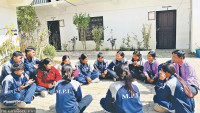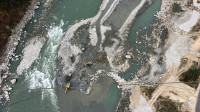National
Khadka holds talks with Indian envoy Srivastava over Agnipath hiring row
Prime Minister Deuba seeks immediate resolution of the matter, as today’s recruitment from Butwal is deferred until further decision.
Anil Giri
Foreign Minister Narayan Khadka on Wednesday held a meeting with Indian Ambassador Naveen Srivastava and discussed Nepali youths’ planned recruitment under the Narendra Modi government’s Agnipath scheme, which has become hugely controversial in India itself.
The meeting took place just a day before the Indian Army’s scheduled plan to recruit Nepali youths in Butwal in Lumbini Province, for its Gorkha regiments.
The Indian Army regularly hires Nepalis for its Gorkha regiments, but after the Modi government in June this year launched the Agnipath scheme, it had sought Kathamndu’s views. The Sher Bahadur Deuba government, however, failed to respond.
The recruitment process in Butwal on Thursday has been postponed for now, officials said, adding that discussions are underway.
The Indian side had earlier in June informed the Nepal government that it would commence recruiting Nepali youths in Butwal from Thursday (August 25) and Dharan on September 1, according to officials privy to the developments.
Just as the Nepal government failed to respond to India, questions also arose over Nepali youths’ recruitment in the Indian Army under the Agnipath scheme.
Some sections in Nepal have always opposed Nepalis' recruitment in the Indian Army. Others say hiring under the Agnipath scheme could be in violation of the 1947 tripartite treaty between Nepal, India, and British governments.
The Indian Army has for long been recruiting Nepali youths but the recent Agnipath scheme has stoked concerns in Nepal. So far, Nepalis hired in the Indian Army would serve their full term—until their retirement—and they would be entitled to pension benefits. Thousands of Nepalis who have served in the Indian Army receive pensions still today.
But those who would be hired now onwards would be recruited under the Agnipath scheme.
Of those recruited under the Agnipath scheme, 75 percent will retire after serving for four years, while 25 percent could be retained by the Indian armed forces and will serve the full term.
Those who will retire after four years will get INR 1.71 million as “Seva Nidhi Package” (interest accumulated on the amount as per the applicable interest rates would also be paid).
The 25 percent of “Agniveers” will be selected for enrolment in the Armed Forces as regular cadres.
As per the Agnipath scheme announced by the Modi government, it will be recruiting 46,000 “Agniveers” this year alone.
The number of Nepalis to be recruited under the Agnipath scheme is likely to be 1,300 for this year, far lower than in the previous years.
After the Ministry of Foreign Affairs failed to respond to the Indian correspondence until the last hour, the matter landed on the desk of Prime Minister Sher Bahadur Deuba who then instructed Foreign Minister Khadka to take an immediate decision, saying it was a sensitive issue, according to sources at the prime minister’s secretariat.
“On Tuesday, Prime Minister Deuba held a meeting with Khadka and Arun Subedi, his foreign relations adviser. Minister Khadka expressed concerns about the future of those who would return after serving for four years [in the Indian Army] and their possible misuse by some unwanted elements,” a member of Deuba’s private secretariat told the Post on condition of anonymity because he was not authorised to speak to the media. “The foreign minister was of the view that there was a need to take a prudent step.”
The member said that the prime minister then asked the foreign minister to hold discussions with all concerned.
Accordingly, Khadka on Wednesday called on Indian Ambassador Srivastava and discussed the matter and informed the latter that the government will take a decision within a day or two, according to an official at the Ministry of Foreign Affairs.
Sources said Prime Minister Deuba was not happy that Foreign Minister Khadka sat on the letter India had sent two months back regarding the recruitment of Nepalis in the Indian Army.
“The prime minister was of the view that since the letter was received some two months ago, there should have been consultations and a decision should have been made on the matter,” said the member from Deuba’s secretariat. “The foreign minister on Wednesday briefed the prime minister on his meeting with the Indian ambassador,” the member added, stopping short of offering details.
Subedi, the prime minister’s adviser, said that the Indian side may defer its recruitment plan as per Nepal’s request to give a couple of days to take a decision.
Since the Agnipath scheme has become a hugely debated issue in India itself, some Nepali leaders said first of all Nepal should initiate the process to scrap the tripartite agreement of 1947 and have a bilateral agreement between Nepal and India, if needed.
“This is our consistent position that the tripartite agreement is not in our favour and this new Agnipath scheme will only militarise the youths, this is also not going good to our society,” said Narayan Kaji Shrestha, senior vice-chair of the CPN (Maoist Centre) and a former foreign minister.
It was the Maoist party that long ago demanded the scrapping of the recruitment of Nepali youths in the Indian, British and other armies.
The Maoist Centre is currently a partner in the Deuba government.
When the party waged a war against the state in 1996 with a 40-point demand, ending Nepali youths’ recruitment in the Indian Army was one of their demands.
Shrestha said that they have not discussed the new Indian scheme inside the party so they have not made any official position yet.
“We have to analyse the social and other ramifications… as under this scheme many will be hired only for four years,” said Shrestha. ‘The Agnipath scheme has courted controversy in India itself, as some believe it will make every youth a military person at some point of life. This could be in India’s national interest. But we need to think if it is in our interest.”
According to Shrestha, the Maoist position that the 1947 tripartite agreement should be abolished is still valid now.
“Recruitment of Nepalis in any foreign armed forces should be stopped,” he said. “And if we need or feel that such recruitments should be allowed, we can reach a bilateral agreement with Indians by forging a national consensus.”




 16.4°C Kathmandu
16.4°C Kathmandu














